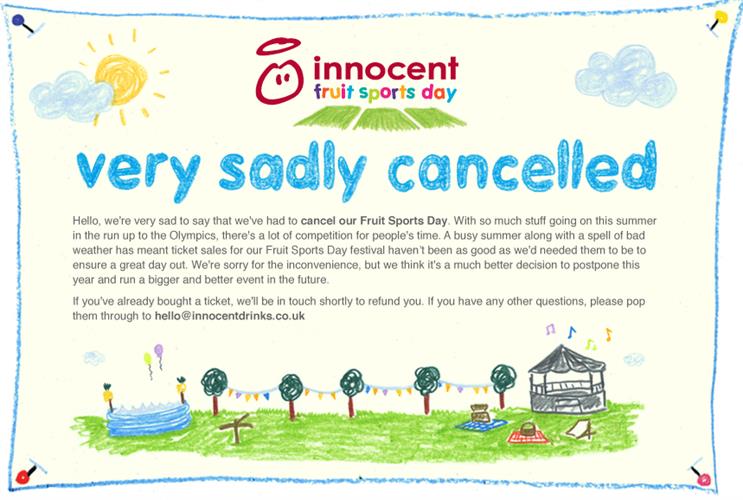
The Olympics may have been in brands' diaries since 2005, but even the best-laid plans could be stretched this summer, due to competition from wall-to-wall marketing by Games sponsors and a packed events calendar.
The 'perfect storm' of the Diamond Jubilee, Euro 2012 and the Olympics is an immense opportunity for brands, but how should marketers react if their summer plans fall flat?
Smoothie brand Innocent, for example, has cancelled its summer 'Fruit sports day' festival, planned for July, because of poor ticket sales. The Coca-Cola-owned brand places the blame for the low take-up on there being 'so much stuff going on this summer, there is competition for people's time'. Innocent adds that bad weather was also putting people off attending the outdoor festival (see Forum, page 25).
Careful preparations
 Clearly, marketers have been preparing for a long time to ensure their brand's voice is heard above the din of the planned festivities. As Richard Tolley, an interim marketer working at Mars Confectionery, acknowledges: 'We've known for seven years that the Olympics is coming up, and we've known about LOCOG and the Olympic sponsors. It is like any media event, it is a known fact, the annual brand plan should have foreseen it.'
Clearly, marketers have been preparing for a long time to ensure their brand's voice is heard above the din of the planned festivities. As Richard Tolley, an interim marketer working at Mars Confectionery, acknowledges: 'We've known for seven years that the Olympics is coming up, and we've known about LOCOG and the Olympic sponsors. It is like any media event, it is a known fact, the annual brand plan should have foreseen it.'
However, if the unthinkable happens, and your brand's summer 2012 marketing is more washout than splash, how should you react? We asked senior marketers and industry experts:
1 Accept defeat. Jamie Wynne-Morgan, managing director of M&C Saatchi Sport & Entertainment, advises brands to be brave and move quickly to limit damage. 'You have to act decisively - it would have been horrific if Innocent had cancelled the festival two days beforehand. It has made the decision long enough in advance for there to be a good perception that they have done the decent thing. They don't need to drag it out any more, and I don't believe it will damage the brand.'
2 Never waste a crisis. 'It is rare that a failure is the end of the story. You have to consider what happens next,' says Mark Lund, founder of ad agency Now. He argues that marketing failures can be turned into successes, pointing to the New Coke fiasco in 1986, which had the upside of acting as a reminder to consumers of the popularity of the original Coca-Cola when it was re-introduced a few weeks later. The key to turning a crisis into a benefit is to admit there is a problem and find creative ways of addressing it, he adds. Innocent has promised that it will stage 'a bigger and better event in future'.
3 Act responsibly, improve loyalty. Brands should use a disappointment to build bridges with their most valued consumers, says Melanie Puddick, global client director at Added Value. 'It is a nightmare for Innocent. The ticket-holders are their most-engaged consumers. Innocent needs an all-out charm offensive.' Vicky Bullen, chief executive of branding agency Coley Porter Bell, agrees that handling the situation in a respectful way, such as by issuing immediate refunds for an event, can 're-boot' a brand's relationship with loyal consumers. 'You have let them down, so it is time to make it up to them,' adds Bullen. 'It is important how you get them onside. This might mean re-evaluating what you are saying and what you stand for.'
4 Use social media to react. Robin Grant, global managing director of We Are Social, says social media offers marketers the means to stop a crisis getting out of control. 'Social media can be the cause of bad publicity, but it can also be the cure as it gives marketers the tools to react,' he says. One example was Electronic Arts' (EA) response to complaints about its Tiger Woods PGA Tour 09 game, in which a bug allowed characters to stand on water. EA reacted by shooting a video of Woods 'walking on water', which attracted 2m YouTube views. Grant adds: 'A brand's marketing team needs to be set up to act quickly and use their creativity.'
5 Tackle the online 'debris'. As the dust settles on any issue like this, the time comes to clean up and move on,' says Paul Mead, founder of VCCP's search and media division. Because of the fact that negative content can hang around in a brand's search engine results, Mead warns companies not to overlook this virtual 'debris'. 'Bring all your content together to show that the business has been honest and creative in its response. Search is a vital part of the clean-up operation.'

